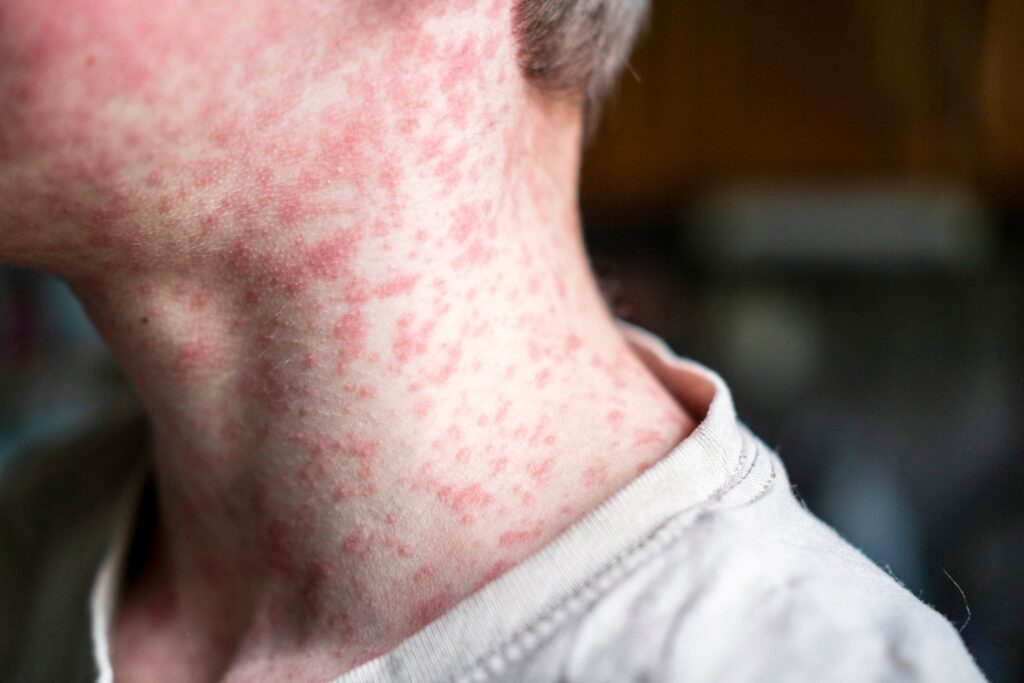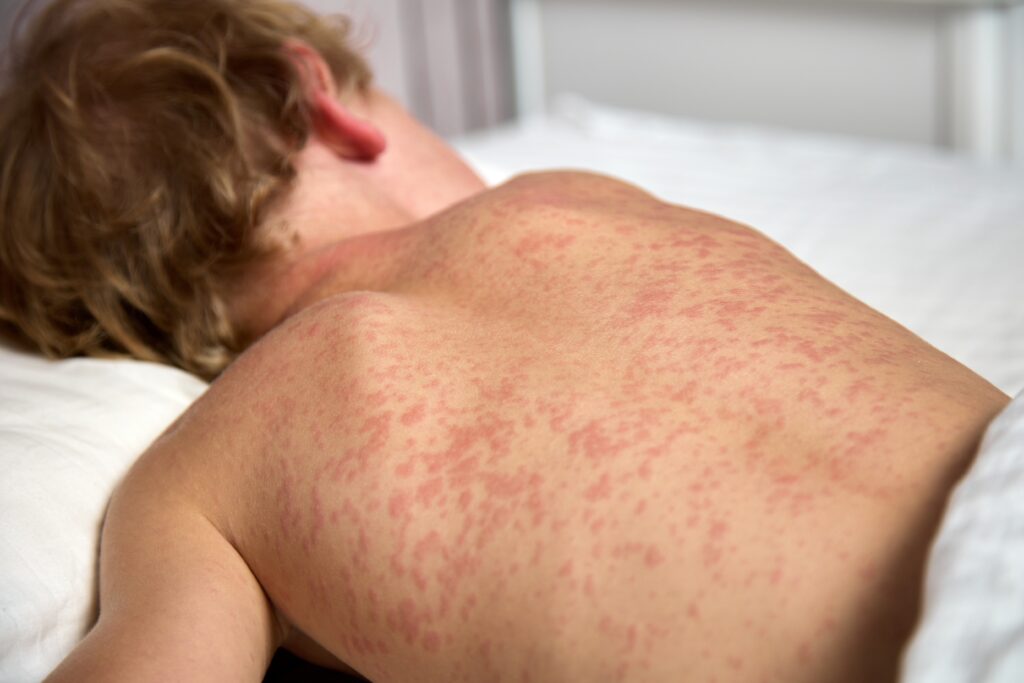Measles is a highly contagious virus (easily spreads to others) that spreads through the air when an infected person coughs or sneezes. It is so contagious that if one person has measles, up to 9 out of 10 people around that person will also become infected if they are not protected. Vaccines are recommended to prevent measles.
What is Measles (Rubeola)?
Measles is a highly contagious viral infection and can be very serious. About 9 in 10 people without immunity (via vaccination or previous infection) who come into close contact with someone with measles will get it.
This virus is known to be spread through the air by respiratory droplets that are produced through coughing or sneezing. It is possible to contract measles just by being in the same room where a person with measles has been. This can happen even up to 2 hours after that person has left.




Signs and Symptoms
It is important to seek care immediately if you suspect you or your child have been exposed to measles (when you do, call ahead to the provider so they can put the proper precautions in place to minimize the risk of infecting others). Symptoms usually appear within 7-14 days after exposure to the virus and may include:
- Fever ≥101o F (may spike to over 104˚F)
- Cough (develops in the early stages of infection)
- Runny nose (also known as coryza)
- Red, watery eyes (also known as conjunctivitis)
- Rash (red, blotchy rash that usually appears 3-5 days after first symptoms. Typically, this rash starts on the face and upper body, then spreads to the trunk, hands, and feet). Koplik spots (small white spots that appear inside the cheeks 2-3 days after symptoms begin)
Complications
Measles can cause serious health complications, especially in children under 5, adults over 20, pregnant people, and people with weakened immune systems such as from leukemia or HIV infection. Complications include:
- Ear infections, which occur in about 1 out of every 10 children with measles.
- Diarrhea is reported in less than 1 out of 10 people with measles.
Severe complications include:
- Hospitalization – occurs in about 1 in 5 unvaccinated people in the U.S. who get measles
- Pneumonia – as many as 1 out of every 20 children with measles gets pneumonia
- Encephalitis – 1 child out of every 1,000 who get measles will develop encephalitis (swelling of the brain). This can lead to convulsions and leave the child deaf or with intellectual disability.
- Death – nearly 1 to 3 of every 1,000 children who become infected with measles will die from respiratory and neurologic complications.
- Complications during pregnancy – if you are pregnant and have not had the MMR vaccine it is possible that measles will cause a premature birth or increase the chances of the infant having a low birthweight.
Long-term complications:
- Subacute sclerosing panencephalitis (SSPE) – is a rare but fatal disease of the central nervous system. It can be a result of a measles virus infection acquired earlier in life.
More information regarding measles complications can be found here.
Prevention
The best way to be protected against measles is to receive the measles, mumps, and rubella (MMR) vaccine. Children may get 2 doses of MMRV (measles, mumps, rubella, and varicella) vaccine instead. Both the MMR and MMRV vaccines are safe and effective. 1 dose of the MMR vaccine provides 93% protection against measles and 97% protection against rubella while 2 doses provide 97% protection against measles. Both vaccines usually protect people for life against measles and rubella; but immunity against mumps and varicella may decrease over time. It is recommended by doctors that children receive two doses of either of these vaccines as the best way to protect against the virus.
To read more information on when your child should be vaccinated, please click here.
Treatment
There is no specific antiviral therapy that is FDA-approved for treatment of measles. Medical care is generally supportive and helps to relieve symptoms.
Control Measures
People who are exposed to measles who don’t have immunity (via vaccination or previous infection) may benefit from receiving post-exposure prophylaxis (PEP): Receiving PEP within the recommended time frame may help protect against measles or reduce the severity of the illness in people who are susceptible.
Consult your primary care provider to determine whether this option is appropriate.
Vitamin A
Vitamin A does not prevent measles and is not a replacement for vaccination. In some situations, vitamin A can be part of supportive treatment for children with measles. Because Vitamin A can be toxic if too much is given, it should only be given under medical supervision.
Measles Cases and Outbreaks
Despite vaccination efforts, measles remains a public health concern. Recent data highlights the growing number of outbreaks in the U.S.:
As of July 1, 2025, there have been 27 outbreaks* reported and 88% of confirmed cases (1,115 of 1,267) are outbreak-associated. For comparison, 16 outbreaks were reported during 2024 and 69% of cases (198 of 285) were outbreak-associated.
*CDC reports the cumulative number of measles outbreaks (defined as 3 or more related cases) that have occurred this year in the U.S.; state and local health departments have the most up-to-date information about cases and outbreaks in their jurisdictions.
For the most up-to-date information on confirmed measles cases reported to CDC, please click here.
Measles FAQ
For frequently asked questions on measles, click here.
Reporting
For information on how to report a disease click here. For any questions, please contact the appropriate health authority by phone or review the website for additional information.
Carson City, Douglas and Lyon Counties
Carson City Health & Human Services (CCHHS)
(775) 887-2190
Website
Clark County
Southern Nevada Health District (SNHD)
(702) 759-1300
Website
Washoe County
Northern Nevada Public Health (NNPH)
(775) 328-2447
Website
All Other Counties
Nevada Division of Public and Behavioral Health (DPBH)
(775) 400-0333
Website

